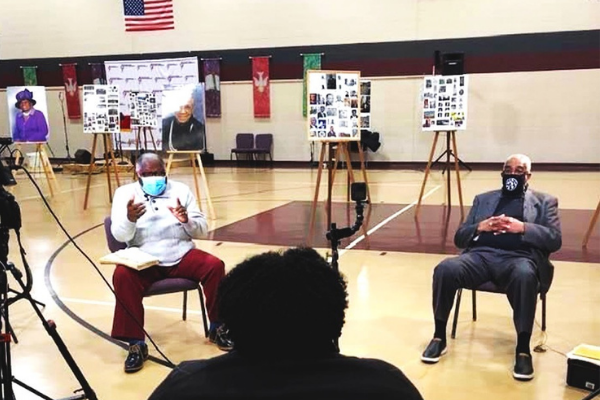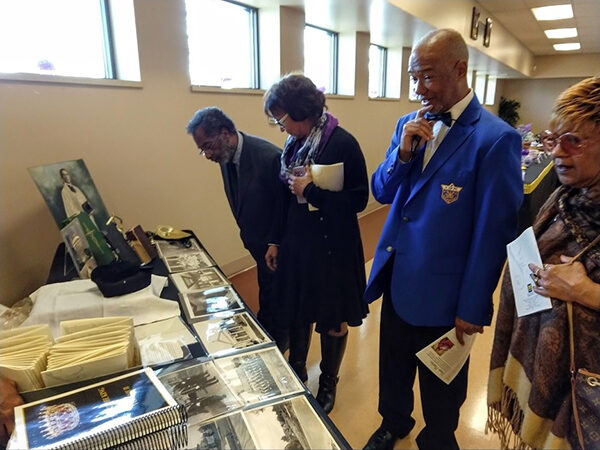
Pastor Freelon Threlkeld and Mr. Norm Bryant share their history with Jerome Threlkeld of the Sloan Museum of Discovery.
A collaborative effort between Flint community organizations and the University of Michigan-Flint is getting backup from a basketball legend’s brand.
The Jordan Brand, Michael Jordan’s organization, selected the Community Foundation of Greater Flint’s Neighborhood Oral History Project for its Black Community Commitment Grant Program. The Flint Neighborhood Oral History Project allies the Community Foundation of Greater Flint, the Sloan Museum of Discovery, Neighborhood Engagement Hub, and the University of Michigan-Flint.
The Jordan Brand selected 18 small organizations that “deliver locally-relevant solutions designed to reduce inequity and meet the diverse needs of the Black community in cities large and small across the country,” according to a news release.
The collaborative effort in the Flint Neighborhood Oral History Project aims to showcase the history of Flint residents using audio and video storytelling. So far, the project has begun with two primary neighborhoods demolished to make way for freeways, along with neighborhood organizations and churches.
Interviews with Flint residents will be placed in a digital archive as well as a future exhibit in the Sloan Museum of Discovery. However, the copyright will belong to the people featured in the stories.
Interviewers involved in the project sit behind the camera and allow residents to tell their stories with little interruption. Topics have included neighborhood memories, segregated schools, and other important historical events, like the Great Migration.
The project grabbed the attention of Michael Jordan’s brand due to its emphasis on Black community and its innovative approach.
According to lead researcher investigator and UM-Flint Associate Professor of English Vickie Larsen, the project is all about bringing Flint residents’ voices to the forefront of history.
“We are moving the mic away from political leaders and even academics to the people whose lived experiences and untold community stories challenge historical myths and help us to better understand the history of this city and this country,” Larsen said. “This is a history project, but our sights are on a future characterized by truth and restorative justice.”

Larsen says that collaboration is pivotal to the kind of work the project is tackling.
“The organizations that have partnered on this project have a shared commitment to truth, racial healing, and transformation in Flint. This makes them an ambitious and energized group that aspires to world-changing work,” Larsen said.
UM-Flint also offers unique resources, such as the GIS Center, to move the project forward. Since the project involves neighborhood-based narratives, spatial visualization is key in displaying findings. The center has assisted in attaching digital materials, such as images and documents, to historical maps of neighborhoods that look much different today.
According to Community Foundation of Greater Flint Community Engagement Officer Lynn Williams, the project will emphasize listening to residents.
“We believe that listening to others’ truth will bring about narrative change for racial healing and transformation in Flint,” Williams said. “Lifting up resident voices through a series of oral histories is just one way to further our impact on racial healing in Flint.”
When Jordan Brand staff members met with the project team via Zoom in August, they were completely on board with the project.
“You had us at ‘the team is preparing to engage in a city-wide year of listening,'” they said.
This city-wide listening has already united Flint organizations and the Jordan Brand. Once this inclusive dialogue is archived, the collaboration can impact how Flint’s history is told worldwide.
Flint residents who are interested in telling their history or their experience of their neighborhood, and UM-Flint students interested in learning more about the digital humanities or getting involved in this local project, are encouraged to email Larsen at vlarsen@umich.edu.


